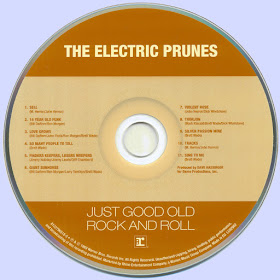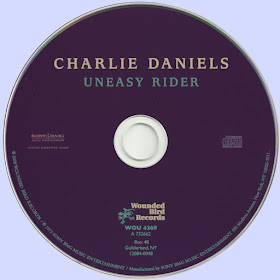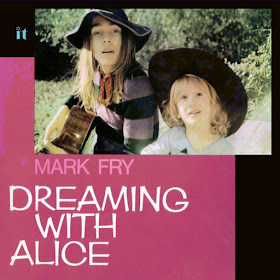Though they notched only two sizable hit singles, the Electric Prunes had a surprising wealth of 45s for a band that are still often unfairly tagged as one-hit wonders. Between 1966 and 1969, almost a dozen seven-inches bearing the Electric Prunes name were issued on Reprise. "The Electric Prunes name" is a key and necessary phrase, since by the time late 1968 rolled around, not a single member remained from the group who'd hit it big the previous year with "I Had Too Much to Dream (Last Night)." This compilation assembles all the tracks released on Electric Prunes singles between 1966 and 1969, acting almost as a snapshot of the evolution of psychedelic music during the period.
When the Prunes first started recorded for Reprise in 1966, however, they were literally right out of the garage, coming to the attention of producer Dave Hassinger after a real estate saleswoman heard them playing in a garage in the San Fernando Valley. Their non-charting debut "Ain't It Hard" was a pounding cover of a folk-rocker by the Gypsy Trips, with a blues-rock tinge not far removed from the Rolling Stones' recent Aftermath, an album Hassinger had engineered. Stonesy rock with a touch of raga was featured on the B-side, "Little Olive," an original by singer James Lowe.
The hint of weirdness became all-out experimental psychedelia on the next single, "I Had Too Much to Dream (Last Night)," right from the bee-humming riff that kicks the track into overdrive before a word's been uttered. Guitarist Ken Williams, Lowe told me in a 2000 interview, "had been shaking his Bigsby wiggle stick with some fuzztone and tremolo...Forward it was cool...backward it was amazing." While Lowe's vocals still dripped with garage band raunch, the eerie melody, subtly shifting spooky electronic whines and wobbles, and bad-trip lyrics took it to the edge of Top Ten. Unbelievably, this Annette Tucker-Nancie Mantz composition was, as bassist Mark Tulin noted to me in an interview the same year, worked up "from a demo that was slow with strings...Pure Vegas lounge-act material." Stones similarities reared their head again on the B-side, "Luvin'," though Tulin stated it wasn't their intention to imitate Aftermath. "But maybe that's the only way Dave Hassinger knew to record a harmonica or slide guitar," he surmised.
Tucker and Mantz were also responsible for the follow-up, "Get Me to the World on Time," which put unhinged psychedelia to a Bo Diddley beat and made it to #27 in Billboard – though that would, surprisingly, be the last Electric Prunes single to crack the Top Hundred. This time the unearthly what-could-be-making-that-noise intro is, according to Lowe, "Dave Hassinger groaning through a mic, into the tremolo on a Fender amp," though for James the song "always lacked something to me, a solo or something. We wanted to do some wild electronic effects and a tone generator is what we settled for." In Tulin's view, "'Get Me to the World on Time' was brought to us primarily because of the title. It was up to [us to] put credibility to their clever lyrics. I can guarantee there was no Bo Diddley beat when Annette played it on the piano."
The Tucker-Mantz team also penned the B-side, "Are You Lovin' Me More (But Enjoying It Less)," which gave rhythm guitarist Weasel (aka Jim Spagnola) a turn on lead vocals. "Most of their material sounded like it was written for a female vocalist," offered Lowe. "I felt a bit uncomfortable with some of it, but at the time we couldn't write anything as commercial, so we just did it."
While Tucker and Mantz were entrusted with the next 45, and Lowe says "we always had a laugh at the variety and scope of [their] images," in retrospect their "Dr. Do-Good" seems like a downright daffy choice for a fourth single. Sounding more like a horror movie theme run amok than a radio-ready hit, it crept to a mere #128 on the Billboard listings. That's Hassinger's maniacal laugh at the end, Lowe confirmed, as "I told him I couldn't do it and he kept showin' me how, so we said, 'You do it.'" Lowe and Tulin got one of their own numbers on the B-side, "Hideaway," which Mark characterized as "our attempt to synthesize the Indian style with the rock sensibility."
Another pair of tunes from their most innovative album, Underground, was chosen for the next single, with Lowe-Tulin compositions gracing each side. "The Great Banana Hoax" was only a little less weird than its title, at a time when, as Tulin said, "we were trying anything and everything to see what it would sound like." It missed the charts entirely, and in retrospect he felt "Hassinger lost interest in the band very quickly, as when there was not an obvious follow-up single to 'Get Me to the World on Time,' he thought the band wasn't worth bothering with at all. Dave was a single sales mentality in an album sales environment. We were just the opposite." Somewhere around the peak of their popularity, however, the group did find time to cut the instrumental track for a minute-long ad for Vox's then-new wah-wah pedal, included here as a bonus cut. "You can even make your guitar sound like a sitar!" exclaims an overexuberant Vox spokesman as the Prunes demonstrate the various ways in which the effect can be deployed.
Fortunately, the Prunes got one last chance to crack the singles market with a non-LP 45 before they'd get a complete overhaul. "Everybody Knows You're Not in Love" was almost normal enough to be a weird anomaly by Electric Prunes standards, though its bouncy pop was disrupted by some typically wobbly psychedelic guitar work in the instrumental break. Tulin thought "the demo we made was much better than what ended up being released," and more of the group's personality came through on the B-side, "You Never Had It Better." Equal parts abrasive, bluesy garage rock and fierce psychedelia with magnificent distorted guitar howls, it nonetheless suffered some dilution when a four-letter word was blanked out, though Mark admitted the band "knew that would never fly."
The last two-sided single issued by the lineup when Lowe and Tulin remained aboard was taken from their third album, Mass in F Minor. Neither these two tracks ("Sanctus" and "Credus") nor anything else on the LP, however, were written by the band, who were enlisted to perform a suite of Latin religious songs written and arranged by David Axelrod. "It was his baby," commented Lowe. "They wanted a sound from us to hang the mass on." Uncommercial even in comparison to the Prunes' recent singles, it too failed to chart. So did an odd megarare one-sided promotional 45 titled "Shadows," recorded for the film The Name of the Game Is Kill, that was far truer to the band's earlier psychedelic sound. "I think they wanted the Doors to do it," Lowe told Record Collector. "It sounds like a Doors song."
As the Electric Prunes name was owned by Axelrod's manager, Lenny Poncher, by the time of their fourth album (late 1968's Release of an Oath), none of the musicians who'd appeared on their prior releases remained. Both sides of their next single, "Help Us (Our Father, Our King)"/"The Adoration," were taken from this LP, another production featuring psychedelic arrangements of Axelrod-penned religious songs, this time based on the Jewish Kol Nidre prayer. "I think I wrote the whole goddamn album in, like, 48 hours," Axelrod told me in a 2006 interview. "I thought it came out pretty good."
The new Prunes also did a more conventional non-LP single, "Hey Mr. President"/"Flowing Smoothly." "Dave Hassinger had a bright idea about recording a topical, if not somewhat political song," drummer/singer Richard Whetstone told me in a 2006 interview. "Dave insisted that we record it. For the background vocals, [bassist/guitarist] Brett Wade and I sang falsetto into a microphone that was wired through a spinning Hammond B3 Leslie speaker." Wade wrote the B-side, and the group were able to record mostly original material for their final album, 1969's Just Good Old Rock and Roll.
Two singles drawn from that LP bring this collection to a close. "Violent Rose" sounds more San Francisco than Los Angeles with its carefree air and sunny harmonies, with its flipside, "Sell," boasting an organ-paced heavy rock sound closer to Steppenwolf than vintage Prunes. Traces of San Francisco acid rock can also be heard on their final 45, "Love Grows," though the flipside, "Finders Keepers, Losers Weepers," was co-penned by Jimmy Holiday, a co-author of Jackie DeShannon's 1969 hit "Put a Little Love in Your Heart." According to Whetstone, "Finders Keepers, Losers Weepers" was the one song Hassinger directed the latter-day Prunes to record besides "Hey Mr. President."
As Whetstone noted, this incarnation of the Prunes realized "the identity of Electric Prunes was with the original band. Quite frankly, as time has borne out, what made the Prunes popular was the original material, and 'Too Much to Dream' is the signature song of the group." Yet the Electric Prunes had much more to offer than just the one song with which they're most frequently associated. As this anthology proves, they were one of the most unpredictable psychedelic groups in a genre that thrived on unpredictability.
by Richie Unterberger
Tracks
1. Ain't It Hard (R. Tillison, T. Tillison) - 2:12
2. Little Olive (James Lowe) - 2:41
3. I Had Too Much To Dream Last Night (Annette Tucker, Nancy Mantz) - 3:00
4. Luvin' (Mark Tulin, James Lowe) - 2:07
5. Get Me To The World On Time (Annette Tucker, Jill Jones) - 2:33
6. Are You Loving Me More (Annette Tucker, Nancy Mantz) - 2:25
7. Dr. Do Good (Annette Tucker, Nancy Mantz) - 3:33
8. Hideaway (Mark Tulin, James Lowe) - 2:47
9. The Great Banana Hoax (Mark Tulin, James Lowe) - 3:20
10.Wind-Up Toys (Mark Tulin, James Lowe) - 2:30
11.Everybody Knows (You're Not In Love) (Mark Tulin, James Lowe) - 3:04
12.You Never Had It Better (Mark Tulin, James Lowe) - 2:08
13.Sanctus (David Axelrod) - 2:56
14.Credo (David Axelrod) - 5:00
15.Shadows (Gordon Phillips) - 2:24
16.Help Us (Our Father, Our King) (David Axelrod) - 3:19
17.The Adoration (David Axelrod) - 3:50
18.Hey Mr. President (Mark Barkan, Ritchie Adams) - 2:50
19.Flowing Smoothly (Brett Wade) - 3:06
20.Violent Rose (John Herron, Dick Whetstone) - 2:28
21.Sell (M. Herron, John Herron) - 3:20
22.Love Grows (Bill Daffern, John Fleck, Ron Morgan, Brett Wade) - 3:43
23.Finders Keepers, Losers Weepers (Jimmy Holiday, Jimmy Lewis, Cliff Chambers) - 3:03
24.Vox Wah Wah Pedal Radio Spot - 1:02
The Electric Prunes
*James Lowe - Vocals, Autoharp, Rhythm Guitar, Tambourine
*Ken Williams - Lead Guitar
*James "Weasel" Spagnola - Rhythm Guitar, Vocals
*Mark Tulin - Bass Guitar, Piano, Organ
*Preston Ritter - Drums, Percussion
*Michael "Quint" Weakley - Drums (1967 Underground, 1968 Mass In F Minor)
*Mike Gannon - Rhythm Guitar (1968 Mass In F Minor)
*Richie Podolor - Guitar (1968 Mass In F Minor)
1968 Release Of An Oath
*Howard Roberts And Lou Morrell - Guitar
*Don Randi - Keyboards
*Carol Kaye - Bass
*Earl Palmer - Drums
1969 Just Good Old Rock And Roll
*Ron Morgan - Guitar
*Mark Kincaid - Guitar, Backing Vocals
*John Herron - Organ
*Brett Wade - Bass, Backing Vocals, Flute
*Dick Whetstone - Drums, Lead Vocals
Related Act
1970 Pride - Pride
Free Text
Text Host




























